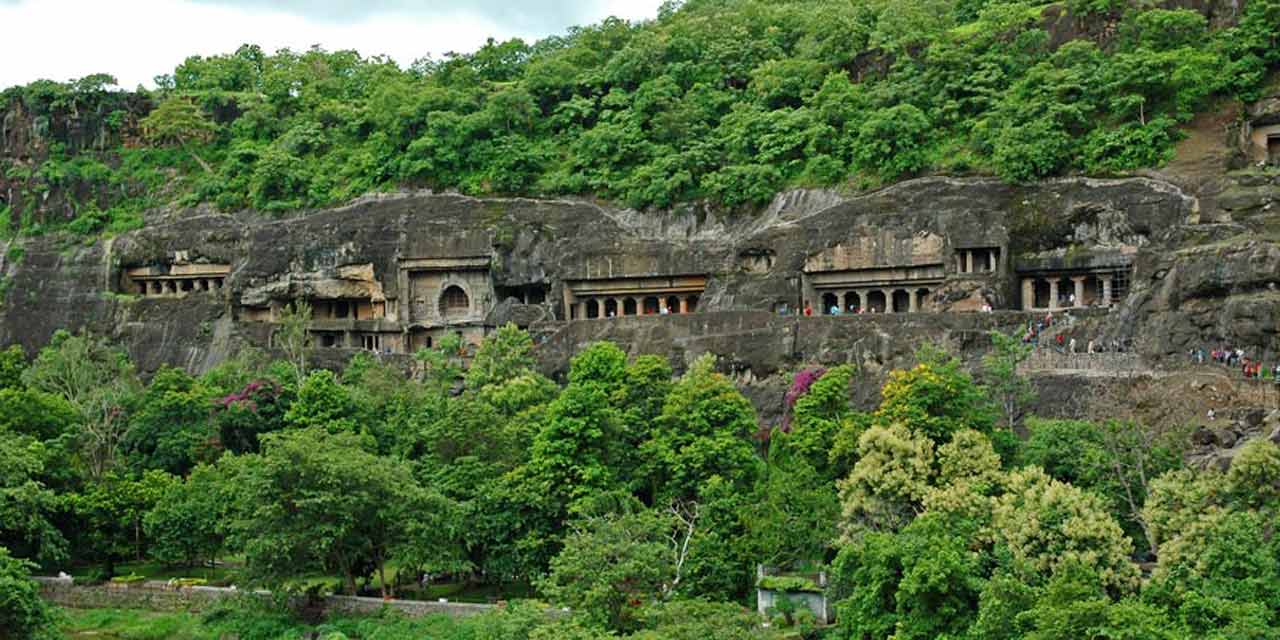
Day 01 :-
Pick up From Aurangabad Transfer to Hotel. After Fresh up Visit Daulatabad Fort (Devgiri Killa), Evening Free time , Night Stay at Auranagabad
Day 02:-
After Breakfast go for Sightseeing Visit Grishneshwar Temple near Ellora (One of the 12 Jyotirlinga Temples of Lord Shiva). Visit Ellora Temple, Grishneshwar Temple, Bibi Ka Maqbara, Panchakki Visit Ellora Temple (40 kms), Grishneshwar Temple (nearEllora Temple), Bibi Ka Maqbara(Taj replica) and Panchakki (Watermill).
Day 03:-
Breakfast and proceed for full day Excursion to Ajanta – (closed on Monday) These 2nd century caves are fine achievements by Buddhist monks. Beautiful frescoes, wall paintings and vivid sculptures reflect the peak of ancient Indian art and architecture. The horseshoe shaped gorge has 30 caves dividend in two phases. Return back to Hotel. Overnight
Day 04:-
Departure Depart for onward Journey.
|
Cost Include:- |
Cost Excludes |
|
|
|
Destionation |
Standard |
Deluxe |
Luxury |
|
Aurangabad |
Hotel 7Apple /Similar |
Hotel vitz Excellency |
Hotel Lemon Tree |
|
Rates valid from 01 Dec 2020-30April2021 EXTRA BED CHARGES: EXTRA PERSON / CHILD WITH EXTRA BED Below mentioned rates are per person only. |
||||||||
|
Room type |
Standard |
Deluxe |
Luxry |
|||||
|
Rates on CPAI Plan |
02 pax |
8682/- |
02 pax |
11472/- |
02 pax |
12072/- |
||
|
04 pax |
5646/- |
04 pax |
8436/- |
04 pax |
9336/- |
|||
|
06 pax |
5186/- |
06 pax |
8010/- |
06 pax |
8910/- |
|||
|
EXTRA CHILD CHARGES WITH EXTRA BED (6-11 YEARS)
|
||||||||
|
Room type |
Standard.
|
Deluxe
|
Luxury.
|
|||||
|
CPAI Plan |
1800 |
2520 |
1800 |
|||||
Aurangabad (About this soundpronunciation (help·info)) is a city in the Indian state of Maharashtra. It is the administrative headquarters of Aurangabad district and is the largest city in the Marathwada region.[4] Located on a hilly upland terrain in the Deccan Traps, Aurangabad is the fourth-most populous urban area in Maharashtra with a population of 1,175,116. The city is known as a major production center of cotton textile and artistic silk fabrics. Several prominent educational institutions, including Dr. Babasaheb Ambedkar Marathwada University, are located in the city. The city is also a popular tourism hub, with tourist destinations like the Ajanta and Ellora caves lying on its outskirts, both of which have been designated as UNESCO World Heritage Sites since 1983.[5] Other tourist attractions include the Aurangabad Caves, Daulatabad Fort, Grishneshwar Temple, Jama Mosque, Bibi Ka Maqbara, Himayat Bagh, Panchakki and Salim Ali Lake. Historically, there were 52 Gates in Aurangabad, some of them extant, because of which Aurangabad is nicknamed as the "City of Gates". In 2019, the Aurangabad Industrial City (AURIC) became the first greenfield industrial smart city of India under the country's flagship Smart Cities Mission.[6][7]
Paithan, the imperial capital of the Satavahana dynasty (1st century BCE–2nd century CE), as well as Daulatabad or Dēvagirī, the capital of the Yadava dynasty (9th century CE–14th century CE), are located within the limits of modern Aurangabad. In 1308, the region was annexed by the Delhi Sultanate during the rule of Sultan Alauddin Khalji. In 1327, the capital of the Delhi Sultanate was shifted from Delhi to Daulatabad (in present-day Aurangabad) during the rule of Sultan Muhammad bin Tughluq, who ordered a mass migration of Delhi's population to Daulatabad. However, Muhammad bin Tughluq reversed his decision in 1334 and the capital was shifted back to Delhi. In 1499, Daulatabad became a part of the Ahmadnagar Sultanate. In 1610, a new city named Khaḍkī was established at the location of modern Aurangabad to serve as the capital of the Ahmadnagar Sultanate by the Ethiopian military leader Malik Ambar, who was brought to India as a slave but rose to become a popular Prime Minister of the Ahmadnagar Sultanate. Malik Ambar was succeeded by his son Fateh Khan, who changed the name of the city to Fatehnagar. In 1636, Aurangzeb, who was then the Mughal viceroy of the Deccan region, annexed the city into the Mughal Empire. In 1653, Aurangzeb renamed the city as "Aurangabad" and made it the capital of the Deccan region of the Mughal Empire. In 1724, the Mughal governor of the Deccan, Nizam Asaf Jah I, seceded from the Mughal Empire and founded his own Asaf Jahi dynasty. The dynasty established the State of Hyderabad with their capital initially at Aurangabad, until they transferred their capital to the city of Hyderabad in 1763. Hyderabad State became a princely state during the British Raj, and remained so for 150 years (1798–1948). Until 1956, Aurangabad remained part of Hyderabad State. In 1960, Aurangabad and the larger Marathi-speaking Marathwada region became a part of the state of Maharashtra